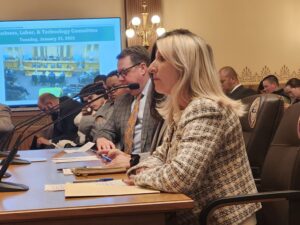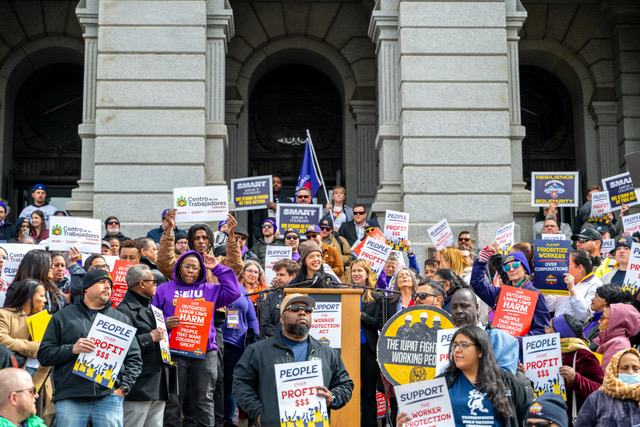By the time Gov. Jared Polis vetoed the proposed overhaul of the Colorado Labor Peace Act on Friday afternoon, there was no question that was the action he was going to take.
However, the wording of his veto letter and of the reaction statements from both proponents and opponents of Senate Bill 5 creates significant questions about what comes next in the battle over workers’ rights.
Union leaders seemingly have decided on their move. Spurred by the governor’s earlier comments on nixing SB 5, they began collecting signatures to put a “Just Cause” initiative on the 2026 ballot three days before he wielded his veto pen. The initiative would require employers to provide documented reasons for getting rid of any worker and outlines a narrow list of reasons that companies could use to justify such actions.
“While this veto is a setback, it’s not the end of the road — it’s the beginning of the next phase,” wrote Colorado AFL-CIO Executive Director Dennis Dougherty after Polis went public with his decision. “Working people are taking this fight directly to the ballot in 2026, where Coloradans can choose to stand with workers and finally end unjust firings and union-busting tactics.”
More talks on Labor Peace Act?
But the governor’s own letter hinted that he is not opposed — and, frankly, seems inclined to support — further negotiations about changing the Labor Peace Act. Even business leaders have seemed to show a willingness to entertain amendments; the question is whether they and union leaders would be willing to come back to the table again.

Gov. Jared Polis speaks to the Colorado Chamber of Commerce board meeting on April 24.
Colorado, like every other state, requires unionization of a company workforce if a majority of employees choose that option at an election. But the Labor Peace Act requires something unique — a second election in which 75% of voters must agree to “union security” before labor is allowed to collectively bargain to deduct negotiating fees from every worker paycheck.
SB 5 would have eliminated the second election, joining Colorado with 23 other states in which an initial vote for organization of the workforce is enough to begin the process of negotiating for union security. A coalition of business groups fought this idea, saying that unions need to clear a higher bar than a simple majority if they are to begin taking 2% deductions from workers’ paychecks without their approval, and Polis agreed.
Over six months of negotiations, business and labor put forth several alternate proposals, each of which envisioned a pathway to eliminating the second election if support at the first election was high enough.
Gap between business, labor proposals
Business groups, for example, offered to eliminate the second election with 66% approval of the first vote and agreed to drop the needed bar for union security to 66% at the second election if a second election was needed. Union leaders countered with a similar proposal but set the bar at 53% — a gap that remained too wide to find compromise.
Polis, heavily involved in the negotiations during the final weeks of session, offered ideas on moving the bar for the first and potentially second elections, and he sought different standards for small and large businesses. When no deal was reached by mid-day on May 3, with the May 7 deadline to end the legislative session looming, unions declared that talks were done and pushed the original wording of SB 5 through the House on a Democrat-led party-line vote.

Colorado state Rep. Javier Mabrey speaks about the Labor Peace Act overhaul proposal on the House floor on May 6.
“Members of my party for too long have not supported common-sense legislation like this to demonstrate definitively that we are on the side of workers,” cosponsoring Rep. Javier Mabrey, D-Denver, said on the House floor.
Polis once again showed a willingness to break with his party, pushing back on claims that the Labor Peace Act falls in line with the 26 right-to-work states in which employees can’t be compelled to pay fees or dues to a union as a condition of their jobs. He said that it has created stability between employers and unions and stated that there should be a higher threshold to require negotiations around union security.
“Avert damaging and costly ballot wars”
But rather than just dismiss the idea of upending the 82-year-old Labor Peace Act, Polis wrote in his veto statement that the law “can and should be amended to more fairly allow workers to choose union security.” While he didn’t offer a specific pathway on how to do that, he wrote that the current system favors unionization of very small companies where the threshold is easier to reach. (Union security also can be achieved if the majority of all workers at a company back it in a second election rather than 75% of the pool of workers casting their ballots in that election.)
In doing so, Polis seemed to open the door to continuing negotiations on the Labor Peace Act through the 2026 legislative session as an alternative to the just-cause ballot initiative, which business leaders view even more warily than they viewed SB 5.
“Changes to this longstanding law, if agreed to by labor and business, could improve on the status quo for both sides, maintain stability in our business environment and avert damaging and costly ballot wars,” the governor wrote. “Constant changes to this provision of law are detrimental to both labor and business, and any changes should be viable for decades — if not for 82 more years.”

Colorado Chamber of Commerce President/CEO Loren Furman testifies in January with a panel of business leaders against the proposed overhaul of the Labor Peace Act.
Business leaders praised the veto. Colorado Chamber of Commerce President/CEO Loren Furman said SB 5 “would have threatened our statewide business climate at a time when we should be fostering a competitive economy.” Colorado Restaurant Association President/CEO Sonia Riggs said the veto “reaffirmed the importance of giving workers a real voice — not just about whether to form a union, but also (about) whether mandatory union membership and dues should be imposed on every employee in a workforce.”
Why the Just Cause initiative looms so large
But Furman particularly noted that the business community came to the table with several proposals attempting to find balance in Colorado’s union-organizing laws and called it unfortunate that the months of negotiations did not produce an agreement. Business leaders are willing to find compromise, she insisted — a statement Polis could interpret as opening the door to continuing negotiations.
The wild card, of course, is the just-cause initiative, which business leaders fear could open the door to a flood of lawsuits from every worker who gets fired and feels like they didn’t deserve it. It lists reasons that serve as just cause — among them, repeated violations of job-performance policies, gross insubordination and crimes of moral turpitude — but requires that employers document the actions and give workers a chance to cure them.
Statements from labor leaders seem to indicate that they are done negotiating over changes to the Labor Peace Act and plan to push forward on this more aggressive worker-rights proposal at a time when workers nationally are worried about federal job cuts. Dougherty said in a statement that the ballot measure would be “a defining moment in our fight for fairness and dignity on the job.”
The question, then, is whether Polis, who brought the two sides to the table with him in an unsuccessful attempt to find compromise on SB 5, will do it again to try to avert a ballot battle that likely will cost tens of millions of dollars from both sides. And that leads to a follow-up question: Are business and labor willing to undertake a second round of talks like the ones that sucked so much oxygen out of the Capitol this session?
